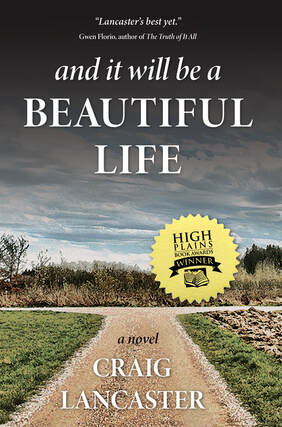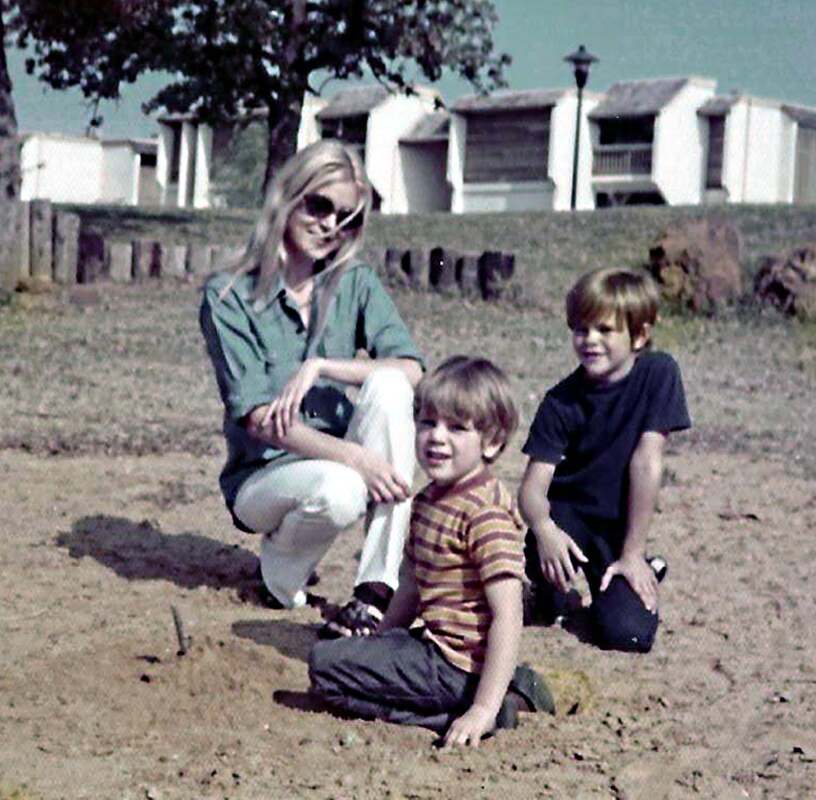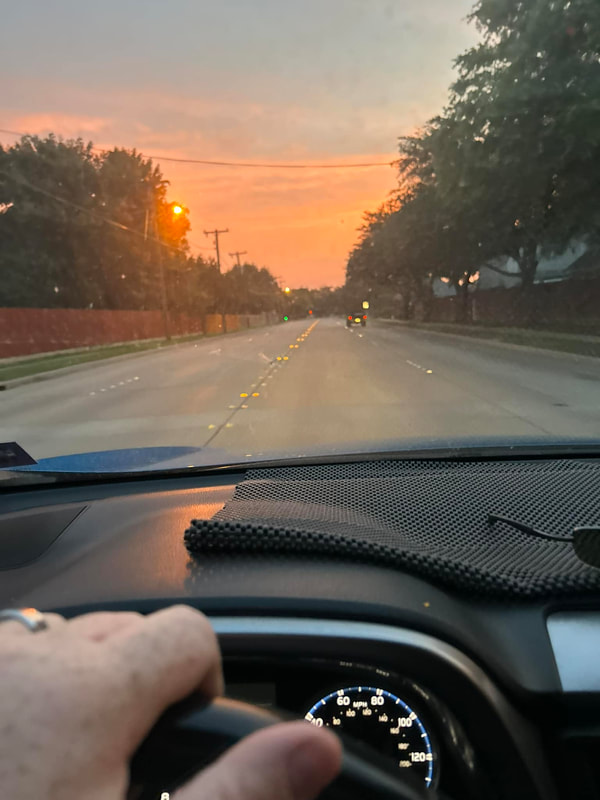|
Here's something new: Really excited to team up with my friends at NOVA Center for the Performing Arts in Billings to present a four-session playwrighting workshop on building characters for stage productions.
We're going to get into the nitty-gritty of constructing compelling characters, putting them into play with and against each other, imbuing them with desire, rolling obstacles at them, and setting the stage—get it?—for moving them through an entire stage piece. It's four Tuesday nights, from April 30 to May 21. Want to join us? Register here!
0 Comments
2/19/2024 2 Comments Like Planes on the RunwayI suppose this could be a Saturday Morning Craft Talk, except it's not Saturday morning* and it's not particularly crafty. So scratch that. No. No, it couldn't. It does, however, speak to an aspect of the writing life, one that varies wildly from writer to writer, if my conversations with colleagues and contemporaries are any guide. What does one do with the ideas when they're not actively being worked on? It's a good question, one with a slapdash answer for me. I'd love to be a capital-letter Artiste, with a leather-bound notebook that never leaves my side, with stacks of brimming journals, with a catalog of every thought I've ever had and a handwritten account of every beauty I've ever witnessed. Alas. I'm just a guy with a brain, such as it is. My ideas—what I've thought of doing, what I'd like to do, what I'm considering, what I've started and not finished, etc.—are all in there, in some stage of marination. It's no doubt a terribly inefficient system, but I'm not complaining. I wrote my first novel in 2008, a breakthrough that came after years of wanting to and not really knowing how. Since then, I've not lacked ideas; indeed, I often describe my notions as being backed up like planes on the runway. But an archivist, I am not. Nor an inventory specialist. Nor a tour guide. Whatever I will or might do is up here—*taps head with index finger*—and I'm the guy with the key. I'll take the key, and the ideas, with me when I go. And that will be that. I've written before about the linear way in which I work—start at the beginning, then write straight through until the end, if I can get there. (I've also written before about how that linearity is subject to the needs of revision, when I'll happily move things around, delete things altogether, or augment the bits that aren't quite cooked.) This, too, is a terribly inefficient system, in that my early days of writing fiction were marked by a sense of loss and bewilderment when a manuscript just didn't go. I'd stash whatever I'd managed to do on a hard drive somewhere, nurse my wounds, shake off the disappointment, then try again with another idea. Fortunately, a new one would be at the ready. Planes and runways and all that. Those half-baked attempts, tucked away in their little folders, were dead things I couldn't bring myself to bury, even though I knew I wouldn't resuscitate them. A few things got salvaged for other purposes--Somebody Has to Lose, at 14,000 words my longest short story, is one such reclamation. But mostly, they take up computer memory and lie dead and crumbling. This used to bother me a lot, just from the standpoint of industry: All that work for nothing. All those words expended and nothing tangible to hold. Boy, was I wrong.  For one thing—and apologies for such a hoary cliche—there's a lesson in every failure, and not every failure is what it seems. This would have come as quite the surprise to the me of 15 years ago, who upon breaking through and at last writing a novel thought he had figured everything out. I didn't know anything. If possible, I know even less today than I knew then. Or I simply know different, better things. For instance... I've learned to wait on it. The manuscript that became And It Will Be a Beautiful Life came out slowly amid several stops and starts, and over the course of a few years. I started it in Montana, pecked away at it in Maine, and found my way through, at last, upon returning to heart earth. It wasn't entirely a function of geography, though I'm convinced that had much to do with it. I simply had the patience to wait for the memories and the imagination to steep properly. That's age. That's experience. That's trust. That's love. A while back, an artist friend introduced me to a well-known author with this: "Craig is a book-a-year guy." True once, but not so much anymore. As a less experienced novelist, I wouldn't have trusted myself to wait for the right idea to emerge in its own time. I wanted, needed, to write the next book, and quickly, if only to prove to myself that I still could. Today, I have no such worries. I know I can do it. I also know the idea I should be working on will let me know when it's ready. Giving it time and space to bloom is granting myself grace in the bargain. I'm increasing the likelihood that I'll find my way through because I'm letting the thing come to me instead of stampeding it. So, about the planes and the runway...
My next novel is just a couple of weeks from being released, the idea having germinated and taken root and blossomed nicely. The one likely to be next is written and ready for the publishing gamut, and that took me the better part of a decade, start to finish. After that? Planes on the runway, baby. I have three manuscripts in various stages of development. I suspect, but don't know, that all will find their way to the finish line. (Big disclaimer: If I have enough time. I've reached a time of life when I worry less about the ideas and more about whether I'll be around to snag all of them.) I'm enchanted with all three stories, but it's not time to finish any of them yet. Soon. Eventually. I trust the process, if not the clock. At long last, I trust the process. *--It's Monday afternoon. Thanks for the long weekend, presidents. 2/3/2024 0 Comments Texas.I moved to Texas when I was three years old. No one consulted me, and I wasn't happy about it, but Texas and I, we found our way. In time, I came to view that move as the most consequential event in my life. When I left Texas for the first time, I was fifteen years old, about to be a sophomore in high school, and I made a snap decision that I'd like to live with my father in rural New Mexico. He'd just been through a divorce, a particularly bad one, and I thought maybe he needed me. It didn't take. A lot of lessons in that, some that got under my skin immediately and others that steeped for many years before I understood. Among the latter group, probably one of the most important lessons: You can't fix for someone else what he must mend on his own. By the end of December, I was back home in North Texas, where I belonged, even if I still felt the fit was a little tight. When I left Texas for the second time, I was twenty-one, and I pointed my nose toward just about the farthest-away dot on my map. I went to Kenai, Alaska, for a sports editor's job. That didn't take, either--though some vital friendships did—and I came scurrying back not six months later. When I left Texas for the third time, I was twenty-three, and it was a job I left behind, a fairly miserable nine-month stint in Texarkana. Texas and I, we were living together uneasily amid irreconcilable differences. I worked at night on the Texas side, then hustled back across the line to Arkansas to set down my head. When I had a chance to leave Texas, off to Kentucky I went. When I left Texas for the fourth—and, as yet, final—time, I was thirty years old and adrift, in the midst of one of those Worst Years Ever that seem to surface every decade. I'd bounced from San Jose to San Antonio, and I'd found Texas to be what it always had been: inscrutable, beautiful, alluring, interesting, and not for me. Back to San Jose I went, but first with a three-month misdirection in Olympia, Washington, and it's like I said: bad year. This is all to say that I've left Texas a lot. But Texas has never left me. The math doesn't lie. Texas had me for most of eighteen years, then nine months, then eight months. Nineteen and a half years, let's call it. Add in various visits over the years—can you really leave a place that harbors your parents and your siblings and your formative memories and some of the best friends you've ever had?—and the total still falls short of twenty years, but let's round it up. Fine. Twenty years of Texas. I'm fifty-three, and on the cusp of the next number up. The scales tip heavily toward everywhere else. Here before too long, Montana will sink its years deeper into me than Texas ever did. It already has more of my heart, more influence on my creativity, a bigger share of my identity. Still, Texas abides. Still, Texas claims me. Still, I claim Texas. Those holds are coming up through my work first, which means they're coming up in my memories. My latest work is drenched in Texas, even if most of it unfolds farther north. There was no way to imagine Nathan Ray, the central character of the ensemble, without first cozying up to the Texas I knew as a boy, then conjuring a backstory where the Texas he knows is a backdrop of pain and disillusionment and gifts he cannot yet see. It's in the next book—the one with a title in flux, the one that may emerge in 2025, or maybe '26—that Texas takes a star turn, a place both abandoned and returned to. Here's a snippet: Texas was gone, falling behind us a mile a minute, and I was relieved and scared all at the same time. You leave Texas little by little and then all at once, yes, but Texas is also a magnet—a big, southerly magnet pulling at everyone else in the country with myths and manufactured romance and jobs and cheap living and low taxes. You can get away, but can you ever really leave? My answer, beyond the bounds of fiction? It's complicated. You can leave, sure. But you come back. The only thing is, I've never made a return stick. But it's early yet. I'm still upright and breathing. In the foreseeable term, of course, I'm not going anywhere. I live in Montana, I love living in Montana, and the father with whom I couldn't live in 1985 really does need me now. He lives in Montana. As long as he draws breath, and probably longer, here I'll be.
But I can't quit Texas, and unlike the answer I'd have given you twenty years ago, I don't want to. It's in my head and my heart and my memories, and the last of those is the most essential ingredient in doing this thing I do. That, I believe, is why Texas seems so insistent these days, like a song that I can't get out of my ears. It's having its say in my work, and I'm making room for it there. Perhaps, in some future I cannot yet see, I'll make other accommodations for it, too. Occasionally, either not knowing my history or not caring, a friend or acquaintance will say something cutting about the place that shaped my boyhood, and thus my life. And I'll cringe, because the cuts are easy enough to administer when Texas serves up such ridiculous stereotypes, such a bloody history, such casually cruel politics. On a day when I can find patience and indulgence for a friend's carelessness, I will say, OK, yes, but Texas is also a vast and beautiful place, full of beautiful people who contain multitudes. Texas isn't made for anyone's tidy little box. It's destined to spill out from whatever attempts to contain it. In short, it cannot be seen in simplicities when its complexities abound. |
About CraigCraig Lancaster is an author, an editor, a publication designer, a layabout, a largely frustrated Dallas Mavericks fan, an eater of breakfast, a dreamer of dreams, a husband, a brother, a son, an uncle. And most of all, a man who values a T-shirt. Archives
July 2024
By categoryAll 600 Hours Of Edward And It Will Be A Beautiful Life Awards Books Bookstores Community Connection Craft Craig Reads The Classics Dreaming Northward Education Edward Adrift Family Geography History Libraries Memory Montana NaNoWriMo Northward Dreams People Plays Poetry Public Policy Q&A Social Media Sports Stage Texas The Fallow Season Of Hugo Hunter The Summer Son This Is What I Want Time Travel Work Writers Writing Archives
July 2024
|






 RSS Feed
RSS Feed